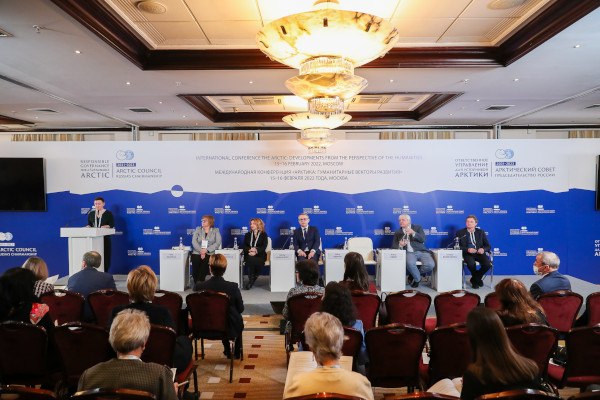The international conference ‘The Arctic: Developments from the Perspective of the Humanities’ took place on 15–16 February as part of the main events of the Russia’s chairmanship of the Arctic Council. The conference was organized and managed by the Roscongress Foundation

The discussions were attended by top Russian and foreign scientists as well as representatives of the Russian Ministry of Education and Science, the Russian Ministry for the Development of the Far East and Arctic, the Russian Ministry of Foreign Affairs, diplomatic missions from Arctic countries, the Russian Association of Indigenous Peoples of the North, Siberia, and the Far East, the Arctic Athabaskan Council, the Saami Council, the Aluet International Association, and the Inuit Circumpolar Council. Presentations were given by 180 speakers from the member countries of the Arctic Council as well as Italy, Hungary, and Estonia. The event brought together 40 universities, 20 research centres and laboratories, eight public organizations as well as independent researchers and artists.
The experts discussed such issues as history, linguistics, art, ethnography, and humanitarian aspects of natural sciences in an effort to find solutions to urgent problems facing the people of the Arctic and ways to preserve their cultural heritage.
Ambassador-at-Large of the Ministry of Foreign Affairs and Chairman of the Senior Arctic Officials’ Committee Nikolay Korchunov stressed that the Arctic region is an important part of the national and international humanitarian space and noted the need to preserve the cultural and historical heritage of the indigenous peoples of the North.
“Russia’s chairmanship implies a special emphasis on the human dimension and improving the quality of life of people who live in the Arctic. This is precisely why Russia in June 2020 initiated the project ‘Digitalization of the Linguistic and Cultural Heritage of the Indigenous Peoples of the Arctic’, which aims to support the humanitarian aspect of the region’s development. The project was supported by the Arctic Council’s Working Group on Sustainable Development. Culture is an integral part of the humanitarian dimension of Arctic cooperation, in which museums play an important role. In this regard, we support the prospect of combining the museum collections of Arctic countries into a single online exposition,” Korchunov said.
“Today, the world community is concerned about climate change and preventing emergency situations in the Far North. However, in order to find answers to the main geopolitical, socioeconomic, and cultural challenges of our time, we need interdisciplinary approaches that take into account all the key factors in the region’s development. The ethno-cultural factor deserves special attention, which requires Arctic research to pivot towards humanitarian knowledge. This is reflected in the priorities of Russia’s chairmanship of the Arctic Council, including the development of human capital, support for indigenous minorities and the preservation of their cultural heritage, international scientific cooperation, and Arctic tourism,” Moscow State Linguistic University Rector Irina Krayeva said.
Russian Deputy Minister of Science and Higher Education Natalya Bocharova said the admission quotas for higher education organizations located in Russia’s Arctic zone have been set at 5,830 state-funded openings for the 2022–2023 academic year, a figures that is 10% higher than the amount approved for the current academic year.
The conference programme includes sections on the art and folklore of ethnic groups of the North as well as reports by prominent linguists on ways to preserve the languages of the people of the North. I believe the conference could become an international and interdisciplinary platform for exchanging experience and summarizing the results of cultural, folklore, historical, and linguistic research in the Arctic region,” Bocharova said.
Alexander Petrov, a professor at Moscow State Linguistic University and chief researcher of the Centre for North American Studies at the Institute of World History of the Russian Academy of Sciences (RAS), pointed out the vast potential for Arctic research between Russian and foreign specialists.
“There is a long tradition of joint conferences. First of all, this includes the study of the historical and cultural heritage of Russian America. I think it makes sense to include the Arctic zone in such discussions. This would be an excellent occasion to bring numerous countries together. Science and education could help resolve many issues related to the current international situation,” he said.
Director of the Fulbright Programme in Russia Joel Ericson also noted the importance of international cooperation in the Arctic region.
“The Arctic is a microcosm of nature and culture. We want to make sure this region is economically sustainable. And we hope that the indigenous peoples will feel protected,” Ericson said.
The conference was organized by the Russian Ministry of Science and Higher Education and Moscow State Linguistic University. The co-organizers were the RAS Institute of Linguistics, the RAS Institute of World History, and the Institute of Translation.
For further info and inquiries about interviews, please contact Think PR:
